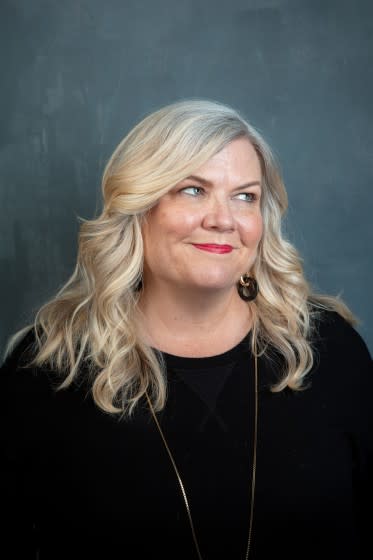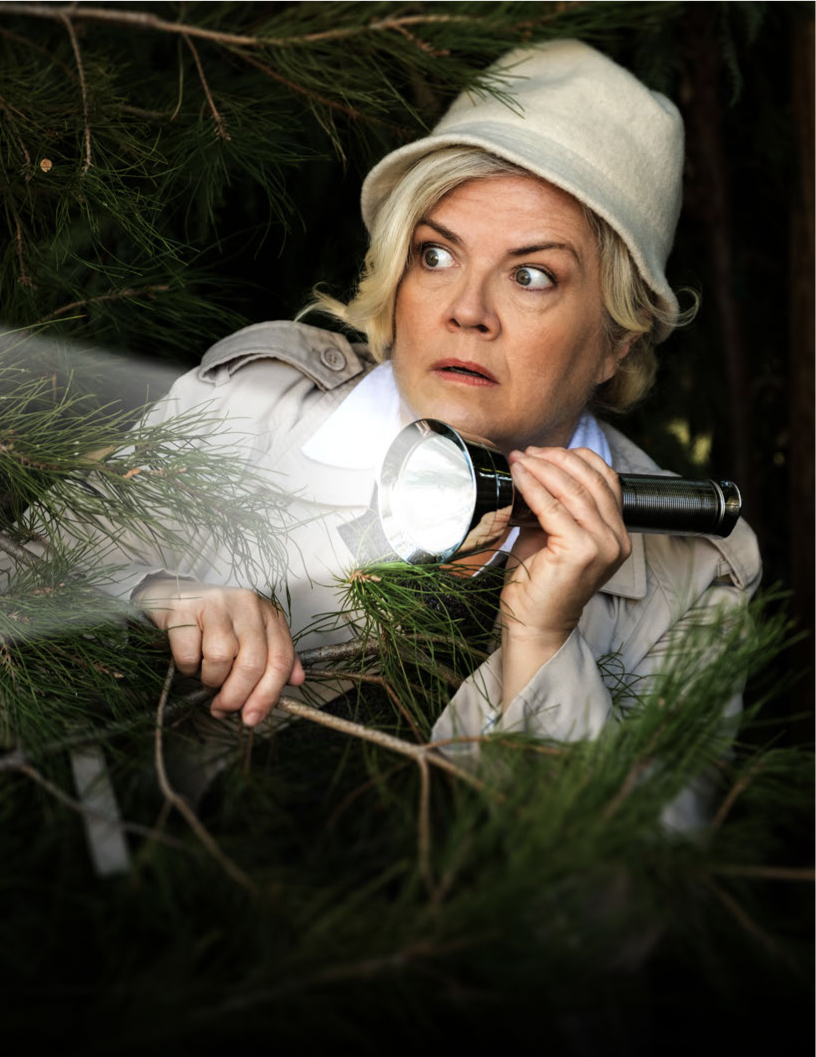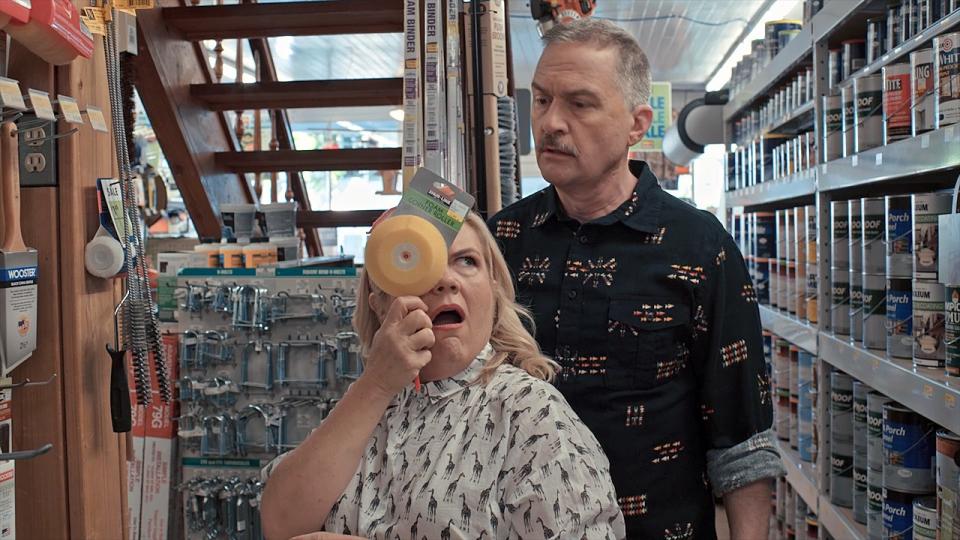'How many Quibis make an episode?' An 'SNL' vet reimagines 'Murder, She Wrote'

I first became fully aware of Paula Pell in 2014, as the co-creator and costar, with James Anderson, of "Hudson Valley Ballers," a brilliantly bizarre web series about friends who open a B&B in upstate New York. But I had seen her work on "Saturday Night Live," for which she wrote for 20 years (including a few seasons as head writer), and had seen her acting, too, as Ron Swanson's mother on "Parks and Recreation" and Pete Hornberger's wife on "30 Rock."
Later there were appearances on "Unbreakable Kimmy Schmidt," Judd Apatow's, "Love," a regular role as the secretary to Patton Oswalt's principal on "A.P. Bio," an Elaine Stritch-inspired turn in the "Documentary Now!" episode "Original Cast Album: Co-op," and last year's women of "SNL" reunion film "Wine Country."
Now Pell is on-screen again — the very small screen — in the cockeyed "Mapleworth Murders," which she co-created with former "SNL" colleague John Lutz. Premiering Monday on Quibi, Jeffrey Katzenberg's heavily capitalized, short-form mobile video app, it stars Pell as mystery novella-ist Abigail Mapleworth — a primly rude twist on Angela Lansbury's Jessica Fletcher from "Murder, She Wrote" — with Lutz as a deputy enamored of her and a sublimely hectic J.B. Smoove as the town's perpetually frustrated police chief. Guest turns by the likes of Tina Fey, Maya Rudolph, Fred Armisen, D’Arcy Carden, Tim Meadows, Patton Oswalt, Andy Samberg, Wanda Sykes, Chris Parnell, Terry Crews and Nicole Byer make it a party.
Pell spoke to The Times recently from Asheville, N.C., where she and her fiancée, comedian and writer Janine Brito, moved — along with five dogs and three cats — to be within a day's drive of family during the pandemic.
You grew up outside Chicago, moved to Orlando, Fla., in high school and after college went back there. Did you ever think of lighting out for New York or L.A.?
I did. I wanted to so badly but I just was so broke, there was just no way. I worked at the mall first, and it was very depressing, especially to be getting your theater degree and having this dream and then just coming home. But once I got in front of a crowd again [performing at Disney World], it was so fun. And also they paid well. So I could have a little car and rent my own little house — I never dreamed I could be a performer and have those. I would visit my friends in New York and none of them even had time to audition because they were working 16 hours in catering. It wasn't until "SNL" that I went to live there, and I actually had a job so I didn't have to do the heavy suffering. And I had some good stories from Disney. That served me well later, to have had that experience.

What was it like?
I worked in such a strange place. There was a nighttime entertainment area called Pleasure Island and it had this place called the Adventurers Club that was like a 1930s social club. And we would do these musical cabarets and shows. But it was really bawdy. My character was called Pamelia Perkins, the president of the club, and I could mingle with guests and do all these comedy bits that were kind of dirty, and it was fun as hell. I really learned a lot about just working on your feet, which I eventually had to do with "SNL." And then I ended up, weirdly, at Universal Studios, where I worked on the "Murder, She Wrote" post-production show — that was all about assembling an episode. I had actually forgotten that until we were doing "Mapleworth."
Do you think your atypical career path gives you a different voice?
I think so, mainly because my biggest rule always has been to write specifically. I would tell young writers, "Who made you laugh growing up? Did you have a funny relative? Did you have a funny neighbor? Did you have a funny teacher?" Because I wrote people. "SNL" was a perfect fit for me because of the recurring characters — which was very big at the time; it's not as big now. My entire life all I've done is sort of imitate people that are either my family or friends or people I used to know, because true life is truly the best, weirdest comedy. Also, if I'm writing the voice of my mother no one else will write that because they've never been with my mother — unless I don't know about it.
A lot of people assumed when I got to "SNL" that it was the typical journey of being from Illinois and doing Second City, but I wasn't really aware of any of it as a teenager, even though I was completely obsessed with "SNL" and comedy. I used to audiotape "SNL" in our basement. I would lay on my stomach on shag carpeting next to the TV with this giant, beautiful Panasonic tape recorder and record all the episodes.
Over the last decade, you've been slowly getting back into performing.
Yeah, it's been kind of a natural development because I no longer need the gray spray. I would always say I was born at 50. I played the Mother Superior in "Sound of Music" when I was in eighth grade. I always had gray spray in my hair in school plays — I played the mom or the grandma or the matron. I'm, like, an old, round character actress now — it's just kind of like, "Yeah, you're good."
Did you miss it?
I missed it so much, but when we started as writers at "SNL," they were very clear about, you know, "You're going to take that hat off, if you were primarily a performer before. We want you to really be here as a writer." And I was such a rule-follower and good Catholic school girl, if you tell me to take that hat off, I'm going put it away in a storage unit. I got to know the cast and would goof around and do bits with them — it was always in me that I was a ham — but I didn't ever want to push myself as an actor. And then over the years my friends would leave and have their own shows and they'd say, "Hey, do you want to do this little part?"

That's the way I picture "Hudson Valley Ballers" and "Mapleworth." "Hey, what are you doing Saturday? Do you want to come be in my movie?"
"Hudson Valley Ballers" was definitely like that. We shot it at my house up in New Paltz — it was really like, "Let's hang a towel in our backyard and put on a show." It was just for James and I, wanting to do something fun and revive our dead souls. James, who was my roommate all through college, was one of the incredible iconic writers at "SNL," who has written everything Kristen Wiig practically has ever done. But the Quibi show was very much a professional thing where you'd have agents check with people's availability and all that — but it'd still be your friends, so you could text or call and be like, "I'm going to tell you what this is in case you hear from your agent." When we did "Wine Country," we had the same feeling. And John and I said this so many times when we were doing "Mapleworth," it's just a shortcut to work with people you love, already know their moves and how to be so funny with them. Especially people when they come out of "SNL" and you end up doing things with them in your later years — that's what I'm calling this, "your later years."
The way you've arranged the "Mapleworth" episodes, three to a story, they play out like a standard, half-hour sitcom.
That's how we tried to do it. At first, it was strange to write something in such a short form, in pieces, and we were like, "How many Quibis make an episode?" We've done shorts, but those didn't really have any narrative in them. But once we thought of it as a three-act thing it didn't feel that different: The first third of it is the setup of the murder, and then let's have some fun and games, and then the third part resolving it. Can you tell I've read my structure books?
I'd never done anything like that with any kind of clues or curlicues in it; it was really fun. I mean, I can watch "Law & Order: SVU" eight in a row. And I've always loved that genre of "Murder, She Wrote" and been a sucker for a spinster character — and in real life loved my relatives who were those older kind of eccentric little kookballs. [Lutz and I] always laugh cause we think Jessica's a little bit judgmental in a really great way; like when she's starting to listen to people's witnessing of the murder, she's always got a little bit of an eyebrow up, like, "Well, if you hadn't been drinking that evening maybe he wouldn't be dead."
When John and I would watch the original in preparation, we would laugh so hard at how leisurely they were. You know, Jessica'd be in a bar and they'd be like, "What would you like to drink?" And she'd look at the menu for like 10 seconds and be like, "I think I would like … a white wine." And you'd be like, "Is this a clue or ... ? Is there a reason she's milking this?"
There is a vein of clueless double-entendre that runs through the show; obviously you don't mind taking your humor low.
Oh, for sure. I had a gram, my mom's mom, she could be really bawdy, but she would also have, like, the little scarf around her neck and her cute little dress for church — she was always tidied up, and she had her little lipstick in her hat and everything. But then she'd be stirring the soup and say, "Well, sonuvabitch." She had that sailor inside her deeply. I love the fact that we occasionally let an f-bomb fly as our characters, because [Lutz's] character too is so innocent — coming on to me, but he's so innocent I can only have pity. And also telling him he can't wait it out cause I'm gay and it's not going to change.
You shot "Mapleworth" on the backlot at Universal.
It was so fun to work on the backlot, because you take those tours when you're young and you're like, "Do they ever make anything back there?" I had shot many other things at Universal, but I'd never really been in that backlot. There's coyotes back there, it's really cool.
It's so funny; especially that street with all the houses — I think "Desperate Housewives" might have been there. It cracks me up, because you can tell that at night it probably does just get taken over by raccoons and coyotes and they're all doing scenes from the iconic shows that were shot there, just doing little scenes with tiny scripts in their hands.


